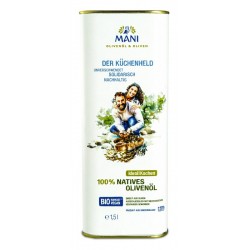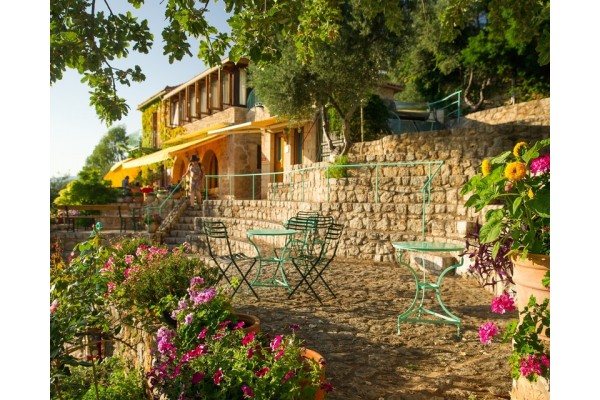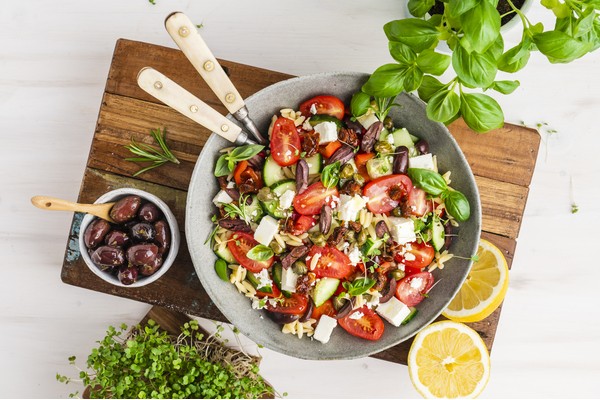Organic is a small word with a big meaning. It derives from “biological” and, according to Duden, is defined by being made from natural materials. But of course it doesn't stop there. What exactly is organic food all about and what are the consequences of adding organic to olive oil? That's what we want to find out …
Benefits of Organic Olive Oil
Healthy trees and an adequate water supply are crucial prerequisites for the thriving of olives. However, trees can be attacked by pests and soils can dry out. Chemicals are effective against pests and irrigation against drought. But should humans really intervene so massively in nature? And what are the consequences for the environment? Can't we be more subtle and still get great results? And how does organic olive oil help us in this context? Questions upon questions. So now quite specifically: what are the reasons for buying an organic olive oil? Well, here are three! And of the “extremely valid” variety! Organic olive oil is …
- in the interests of the environment: A gentle production based on natural resources makes a significant contribution to keeping our planet as blue and green as it is!
- healthy with food safety: Organic olive oils are free from pesticide residues or other contaminants - for worry-free enjoyment!
- flavorful: Does the organic stamp Bio actually taste good? In short: Yes, it depends on the comparison! Basically, high-quality organic oils taste better than cheaper alternatives! By the way, there are also inexpensive organic olive oils – however, they are usually not of the same type. Only those olive oils that are pressed from a single type of olive are considered pure. Cheap organic olive oil, on the other hand, is often a mixture. Sometimes the oil in a bottle even comes from different countries. However, if you already rely on exquisite extra virgin olive oil products, you are in a good starting position in terms of taste. When it comes to the taste of olive oils, the most important factors are the right harvest time, the quality of the fruit on the tree and a low extraction temperature.
Characteristics of organic olive oil
For high-quality olive oil, it is important that the olives are of the best possible quality already direct from the tree. High quality is reflected one-to-one in the end product. Based on the finished oil, an expert can immediately see whether it is a select batch or not.

Healthy olive trees are a prerequisite for organic olive oil
A product may only be sold under the designation organic olive oil if the manufacturing process conforms to the guidelines of the European regulation on ecological/organic production and labeling of ecological/organic products (EU standard 2018/848).
Olive groves are considered to be production sites for organic olive oil if the following aspects are taken into account during cultivation and management:
- Natural weed control: Chemistry has no place in olive groves with the Bio stamp. If you want to prevent weeds in a natural way, you can do this manually, by machine or with the help of four-legged friends.
- Chemical-free pest control: The use of pesticides and synthetic plant protection products are of course a no-go in the organic world. So that the olives can still grow healthy and vigorously, there are biocompatible alternatives, such as physical traps, heat treatment or the spread of natural enemies.
- Organic fertilization: When growing organic olives, synthetic fertilizers are replaced with organic. If you send sheep or goats to the meadow to fight weeds, you can be happy - compost is also ideal as a fertilizer.
- Stainless production: Organic olives only become organic olive oil if the olives come solely into contact with food-grade rubber or stainless steel during production.
- Analytical controls: To exclude pesticide residues, Regular checks must be carried out.
Control & Labelling
Ecological, biological or organic - so what now? All three terms refer to the same product. “Organic” and “ecological” are protected terms by the European regulation, which regulates the use of “organic” and “eco” on the label of olive oils. If you want to be on the safe side, it is better to use olive oils with an organic certificate.
How does the verification work?
According to the European regulation the organic and ecological olive oil producers are controlled by certified supervisory authorities. To this end, private companies are authorized to audit olive oil producers for compliance and to trace the manufacturing process in detail.
What measures do the checks include?
- Soil samples
- Leaf samples
- Fruit samples
- Control of machines
- Equipment control
- Control of depots
How do you recognize an organic olive oil in the supermarket?
The olive oils found to be organic are clearly marked for the consumer. First of all, it must be clear whether olive oil is used in “EU agriculture” or alternatively in a “non-EU agriculture”. If the label of an oil with the designation of origin “EU Agriculture” additionally contains the following labels, it is definitely a certified organic product from Europe:
- European trademark
- Certified Regulatory Authority Code Number
- EU organic logo

The EU organic logo identifies organic food in the EU
Organic olive oil from MANI
MANI is considered Organic pioneer of the Peloponnesian peninsula: Thanks to the two MANI founders Fritz and Burgi Bläuel, Greece's first organic olive oil was certified in 1991. Even then and to this day, MANI passionately pursues ecological cultivation.
Quote from Felix Bläuel, CEO at MANI: „With our fine range of olives and olive oils, we are making a contribution to a diet that benefits both people and the planet in equal measure. Organic, traditional olive cultivation has been our mission for over 40 years. It is a cultural asset of all locals and a livelihood for many families, which we would like to secure and advance for future generations.”

The production of organic olive oil is complex and time-consuming
Since 2014, a large part of the MANI olive oils are cultivated according to the guidelines of the organic farming association Naturland and the processing is also carried out according to Naturland specifications. In addition, MANI undergoes annual organic and fair controls by Naturland. Naturland stands for fair conditions from the tree to the consumer and follows even stricter production guidelines than the EU organic standard.
What you sow, you will also reap! That's why MANI relies on:
- social responsibility
- reliable trade relations
- fair producer prices
- regional raw material sourcing
- community quality assurance
- social commitment
- Corporate strategy and transparency
Conclusion
Organic olive oil has many benefits – for our world and our health. Since strict regulations are followed from the tree to the end product, the production of organic olive oil is complex and time-consuming. Of course, this is also reflected in the price. But here every cent goes into quality!
Julia Löschbrand-Bläuel, co-managing director at MANI: „For us, quality means both excellent taste and good working conditions for everyone involved, including fair wages. And of course, fairly produced olive oil from a competent source has its price. You should normally expect over 10 euros for good olive oil. In my opinion, you can taste this added value!”



















